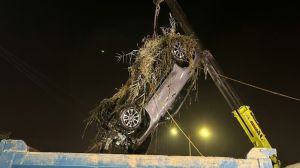Spare the child
The sudden influx of tourists from Thailand has raised concerns of child abuse in the Andaman and Nicobar islands...

For years, the Andaman and Nicobar floated in splendid isolation 8212; at 1,200 km away from mainland India, its natives were left to live in peace. But in December 2004, a giant wave lashed at the islands and the idyllic setting was shattered. The government was forced to intervene and rebuild the island. The plan worked 8212; tourists began flocking to the islands and for the first time, people started talking about development. But in hushed tones, they also talked about fears of child abuse.
Immediately after the tsunami, the Lt. Governor of Andaman and Nicobar Islands and the governor of Thailand8217;s Phuket province signed an agreement on co-operation in the fields of tourism, culture, education, solid waste management, urban development and commerce.
But child right activists fear the tie-up with Thailand and Phuket, which have a history of child abuse, could be bad for the island8217;s children.
8220;Certainly, with Andamans becoming a part of the southeast Asia island circuit, fears of trafficking are high. There is already a high level of illegal immigration into the islands from Burma, Thailand and Indonesia. Currently, though the tourism sector employs a lot of children, there are not too many reports of sexual abuse. But we need to understand that tourism is picking up in the islands.8221; said S. Vidya of the Bangalore-based NGO, Equitable Tourism Options EQUATIONS, which has been working on the
islands.
A few months back, the administration announced that it would throw open 50 sites in 32 islands for 8220;intensive tourism development8221;. The Union tourism ministry also plans to make the island a cruise tourism destination.
The United Nations Children8217;s Fund UNICEF is working on a report on child abuse in the islands. The study 8212; the first such in the islands 8212; was conducted between October 2006 and January this year. 8220;We conducted a study on child abuse in the islands because there is no such data available. We will not be able to develop interventions if we do not have a clear idea of the situation. When we first approached officials, they denied any such problems related to children. Now they are at least listening,8221; said Subhash Misra, UNICEF8217;s tsunami project coordinator in the Andaman and Nicobar Islands.
While working on their report, UNICEF and the Human Rights Law Network HRLN held training sessions for police and judicial officers over the last month on child protection laws. 8220;As far as child protection is concerned, there are interventions being put in place because of the concerns of child abuse,8221; said Kranti Chinnappa of HRLN.
8220;The idea behind these training sessions is to assess the situation and then build the capacity of the police and the judiciary so that they are aware of conventions and laws for children,8221; said UNICEF8217;s Misra.
According to child right activists, the areas of concern were child trafficking, child labour, child pornography and child sex tourism. Activists say that since the islands are secluded with several deserted stretches, reporting child abuse would be difficult.
8220;The concerns are definitely there. Whenever there is large-scale tourism, there will be implications on the ecology and the social setting. We already face problems of drinking water. The point is that tourism should not be promoted without giving a thought to aspects of child abuse and protection,8221; said Pankaj Sekhsaria of Pune-based NGO Kalpvriksh, which works in the islands.
8220;Child abuse in the islands is definitely a worry. We don8217;t have any data or information about child abuse yet. But when we look at it from the tourism perspective, these concerns are valid,8221; said Syed Liyakhat of EQUATIONS.
8220;The concern is real. But I do not think there is a direct connection between the twin city proposal agreement with Phuket and abuse,8221; says Samir Acharya of Saving Andaman and Nicobar Ecology SANE.
- 01
- 02
- 03
- 04
- 05































